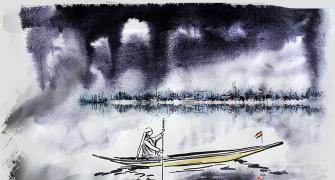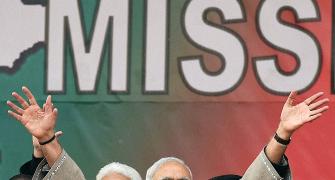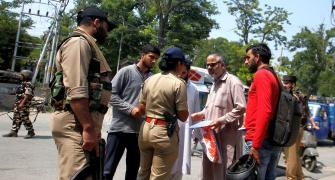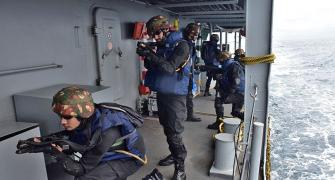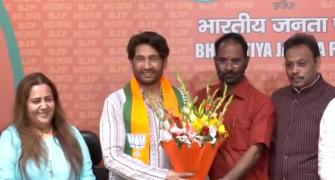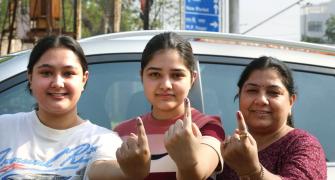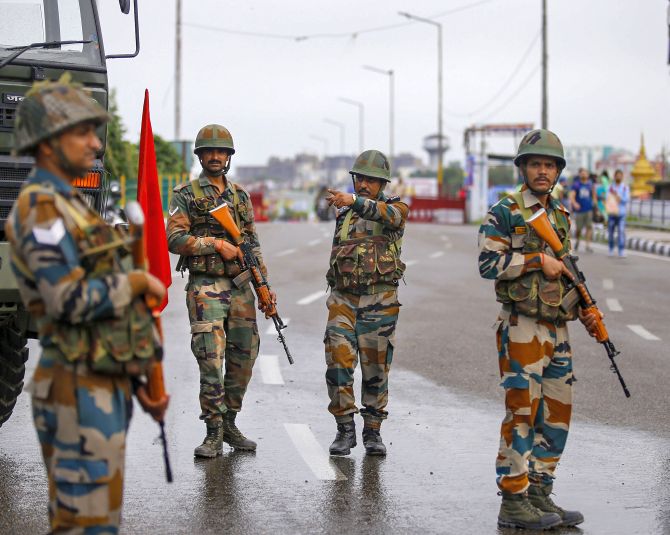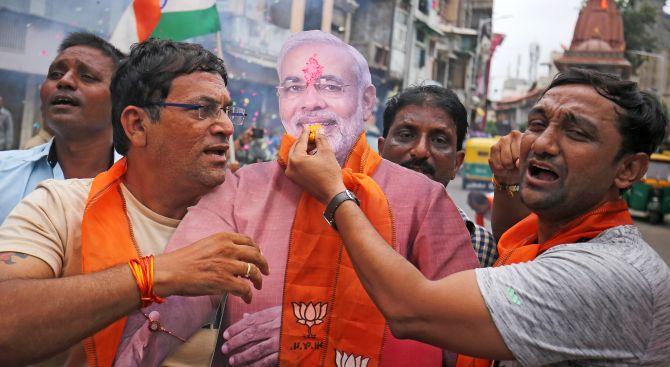‘A couple of Pulwamas will bring the two nations to war and it will be limited to J&K itself.’
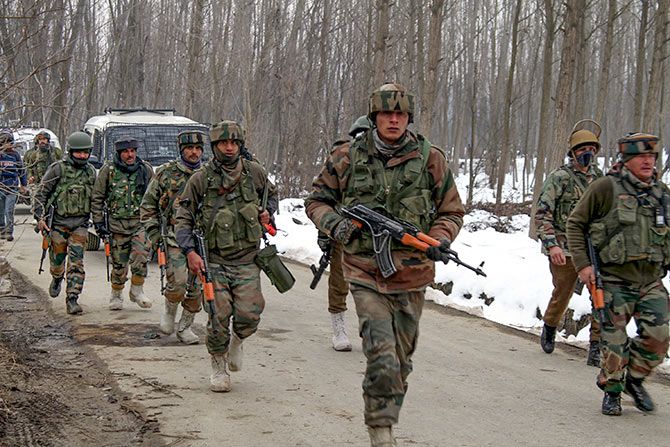
“We are heading progressively towards a deteriorating situation on the LoC,” says Lieutenant General Syed Ata Hasnain (retd).
As commander of the XV Corps based in Srinagar, Gen Hasnain conceived the 'Hearts Doctrine' in Kashmir, and has been hailed as the people’s general. He tells Rediff.com’s Archana Masih what is the best way forward in Kashmir.
What will be the security challenges before the Indian Army and security forces when the clampdown in Kashmir is lifted?
This is a strategic decision at the highest level. In purely military terms, a strategic decision has to be made actionable -- and that is done operationally.
The threats will have to be visualised. The threats emanate from three areas which can undo this strategic decision.
One, the international domain: Pakistan will try and paint India as the villain. It will try and take advantage of what transpired between President Trump and Imran Khan.
The misunderstanding of the term ‘mediation’ and exploitation of the perception in the US; and the exploitation of the changing geopolitics of the Indian Subcontinent.
All this is a plus for Pakistan and they will try to exploit it.
The first occasion where Pakistan will definitely go international and try to brow-beat India once again will be when the United Nations General Assembly begins on September 17.
India has to counter this with a strong campaign which is not diplomatic alone, but with an information based campaign.
It should not only target the diplomatic community of the world, but also the strategic communities -- the various thinks-tanks of Washington, Brussels, Paris, London, Sydney, Singapore etc. We should have the Indian voice everywhere giving a justification for why this was done.
Second, Pakistan wants to keep the J&K issue alive. The best place to do it is on the Line of Control. Tensions have already built up in the last 10-12 days, in the Kashmir segment in particular.
In the last 15 years, most of the tension on the LoC was primarily in the Jammu, Rajouri, Poonch areas, but now Uri, Tangdhar, Gurez etc are becoming very active.
You are finding artillery and mortar firing across the LoC in the Kashmir segment which is a rare thing. This is in aid of the traditional understanding that we have always had of infiltration related to heavy amount of firing by Pakistan to assist in infiltration.
Let’s relate it to why infiltration is required at this time.
Infiltration is desperately required because the terrorist numbers have fallen drastically. This year recruitment has been completely down -- 47 confirmed recruitments till June 30, compared to 190 in 2018.
One of the most important elements of terrorism is human resources, so it makes it necessary for Pakistan to pump in terrorists.
There is a dearth of terrorist leadership in the Valley with many being killed including Zakir Musa. There is no leadership for performing high profile acts.
In such a situation, pin-prick attacks will not make much difference. They will fall into Indian hands if they do that. Pakistan will need a large scale series of coordinated action and that can only be done by well experienced leaders.
So they will try to infiltrate the leadership inside.
This is the time you can expect some officers from the Pakistan army being utilised in the garb of terrorists to organise acts. This happened in 1999 in Sopore and other areas during the Kargil crisis.
What do you make of Pakistan army chief General Bajwa’s threat that they would go to any extent to protect the rights of the Kashmiris?
That is a statement by which he has opened up the whole spectrum. It means from the lowest profile hybrid war to the highest profile conventional war – you pick and choose depending on the situation.
I suspect that Bajwa’s first priority will be activating the streets inside Kashmir, similar to the situation of 2008, 2010, 2016. But I don’t think they will succeed to the extent they did that time because the Indian government very smartly over the last two years has targeted the ecosystem of terror in Kashmir.
Every year we had a list of terrorists who were killed, but what about the over ground workers? The guys who come and have a cup of coffee with the army and at the same time indulge in separatist activity.
Owners of certain big media houses in Kashmir who write insidious literature about India and in the evening are meeting army people. Professors in universities drawing salaries from the government and writing insidious literature against the government -- these are the over ground workers.
This is the ecosystem. There is also the financial ecosystem. It was an invisible system that couldn’t be penetrated easily. There have been attempts in the past to destroy it, but we have not done it seriously -- but in the last two years there has been reasonable success.
Therefore, money has dried up, and the threat of arrests, investigations, raids on J&K bank, threats against high profile families -- all these have gone into diluting the ecosystem.
So the level of terrorism that Bajwa could expect in Kashmir may not come about. The next 10-15 days will tell us because Kashmir is under a lockdown. The first signs will emerge as soon as the curfew is lifted.
There is no defiance of the curfew unlike what happened in Burhan Wani’s time.
Do you fear an upsurge of violence after the measures are removed?
I don’t. The leadership has lost its confidence. Unless the mainstream political parties PDP and NC become like separatists, then that is a completely different matter.
The leadership is in a quandary. The Government of India must help the polity to come out of it and regain self-esteem. Not having a polity in Kashmir is not good. All kinds of elements will enter that space otherwise.
My initial fear was if government measures would push mainstream regional political parties into the separatist fold. But looking at the manner in which Omar [Abdullah] has been handling it particularly, I think they will come around.
There are sops that the Union Territory status is not permanent and when governance improves it may revert. It may never happen, but at least they are saying that it may revert to a status of a state.
If you search your heart, the issue is governance to a large extent. By making it a UT, while they may be diluting the self-esteem of the polity of Kashmir, definitely they will bring the administration and governance under greater central oversight.
The bureaucracy will be more answerable and that may improve overall governance of the state.
People are actually fed up of the corruption and lack of governance in Kashmir.
How long do you think Kashmir will remain under siege?
It is transitional. I think the decision was taken keeping in mind that we are approaching Independence Day when there will be a major threat in the Valley.
The government has been able to paralyse the state to a great extent and therefore for anyone to rally around at this time is going to be a very big challenge.
On August 15, if there is no major attempt at breaking curfew, the clampdown will start progressively diluting after August 15.
General, you were complimented for your measures to win the hearts and minds of Kashmiris as commander of XV Corps. What advice would you give if the PM asked you how to reach out to the Kashmiri people?
At the moment there is no one in India who has the confidence of the people of Kashmir -- like Atal Bihari Vajpayee -- who can actually reach out to the people and convince them that what is happening is good for them.
Neither is there a political party or a community of people who can do that.
My suggestion to the Government of India would be that at this time political consensus works to your advantage.
I quote the example of 1994 when Narasimha Rao’s government was under intense pressure internationally on human rights. He sought the support of Atal Bihari Vajpayee and they passed the joint resolution in Parliament saying that entire territory of J&K belongs to India.
That issue-based political consensus is what we need.
On the issue of winning hearts and minds of Kashmir, let’s have a joint parliamentary committee. They should go and meet Kashmiris, hold public meetings, seminars, meet the youth and put forth the legalities and rationale to them in a friendly manner. The government should reach out to other political parties and take their support for it.
Jammu has a very major role to play. The decision not to split up Jammu from Kashmir is probably the best decision. Someone has done his homework and understood this correctly that Indian states cannot be divided on religious lines.
Geographically isolating Kashmir to create a Muslim majority Union Territory or state would be the worst possible situation.
Indian states are divided on ethnic or linguistic lines, not on religious lines. Although there is a geographical divide between Jammu and Kashmir regions, but the connect is tremendous -- business houses depend on each other, much of the economy of Jammu depends on Srinagar, those who visit Vaishno Devi also make a trip to Srinagar, those who come to Srinagar also go to Vaishno Devi.
We should bring the people of Jammu and of Kashmir from different professions to come together through seminars on gender sensitivity, economy, education, business, sports, etc.
We always have been looking at how to integrate Kashmir with the rest of India, we have never thought about how to integrate Jammu with Kashmir first.
You have to have ideas. I spoke about this at a public function in Jammu and got a standing ovation.
Do you believe Article 370 was a hurdle in bringing development to Kashmir and, secondly, in which areas should development be brought?
The imagination and perception prevailing in the rest of India that people can go and buy property in Kashmir is an erroneous one.
There are ways of protecting Kashmiri property. Himachal Pradesh and Uttarakhand have local laws, Nagaland and Manipur also have similar laws and outsiders can’t buy property there.
So J&K will be protected and I recommend to the government to do this so that Jammu and Kashmir are not swarmed by people.
The tourism sector will see a lot of development. Kashmir has only seen tourism development in Pahalgam, Sonamarg and Gulmarg. The scope of tourism in certain other areas is tremendous.
The start of new industry is difficult because there is no land in Kashmir apart from the higher reaches which will lead to major ecological problems.
But there is potential for eco-friendly village tourism.
These ideas were given by me to the government of J&K many times, but no one would act. Now with central oversight I hope people will be far more enthusiastic.
My recommendation to the Government of India would be to select 30-50 high quality bureaucrats who will be responsible for developing this area looking at it as a conflict zone being developed for peace.
Do you think a conventional war over Kashmir is possible?
I am very much of the thought that it is possible. Pakistan is going to make a lot of mistakes. They think that they will continue these hybrid activities and remain under India’s threshold of tolerance and acceptance.
But they will make mistakes, Pulwama was a huge mistake -- a couple of Pulwamas will bring the two nations to war and it will be limited to J&K itself.
I am convinced we are heading towards more trouble in Kashmir on the LoC. An Operation Parakram kind of situation will come up in J&K in the near future and some major incidents may happen in the Valley.
You are convinced we are heading towards war?
We are heading progressively towards a deteriorating situation on the LoC.
In the event of such a conflict, unlike the 1965 and 1971 wars when the Kashmiri population supported the Indian Army, the Kashmiris may not be on India’s side?
We did not have Rashtriya Rifles at that time. The rear areas of the Valley are well covered by the RR and CRPF battalions.
I don’t think Kashmir is going to rise up because the ecosystem has been impeded. If you don’t allow a rabble-rousing community to rise up again, the rear areas will be reasonably secure.

